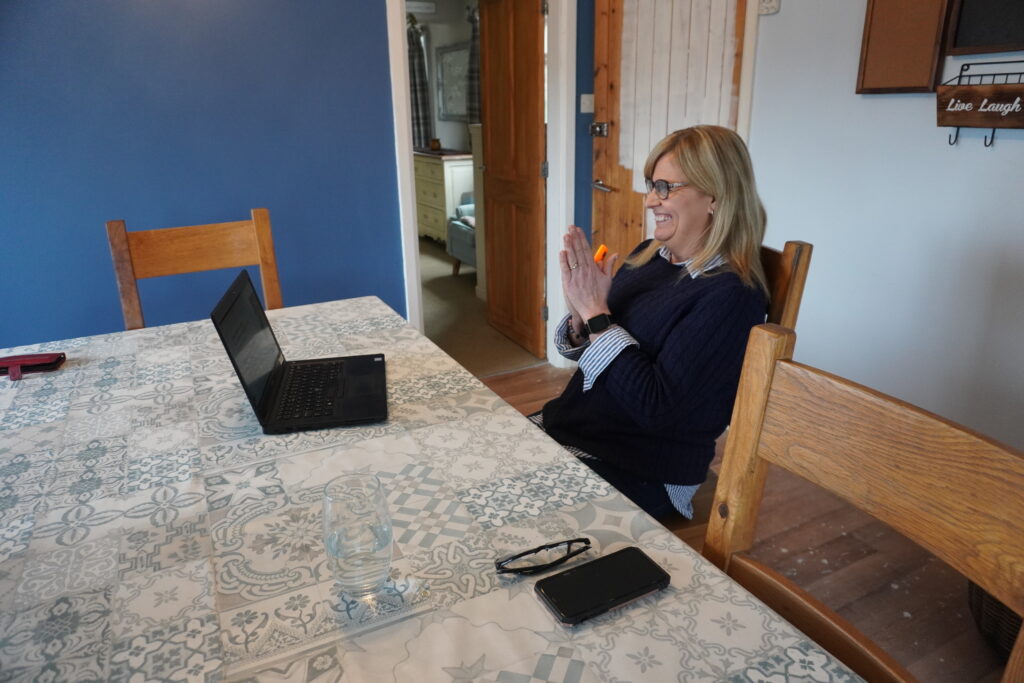Rhys Edwards presents a programme designed by the Welsh National Opera to help people with Long-Covid symptoms.
Earlier this month, I joined Donna Jenkins, a farmer from Mid-Wales, as she set aside an hour of her day to sit and sing opera at her kitchen table. Little more than a year ago, she was not only struggling to speak, there were times when she could barely breathe.
In 2021, Welsh National Opera launched Wellness with WNO, a programme that utilises skills and techniques used by professional opera singers to treat symptoms of Long-COVID. This programme can be prescribed through the NHS Long-COVID service and is now available across all health boards in Wales.
Opera does seem an unlikely method to use to improve a person’s health. On the surface, it’s a little like being advised to take up crochet to mend a broken wrist.
After being diagnosed with Long-COVID, Donna suffered with breathlessness, lost her voice, and developed a stammer. It was suggested that she attend Wellness with WNO as a means to improve her condition, but she was apprehensive at first: ‘I was nervous, but intrigued to see how opera could help my symptoms.’
Opera does seem an unlikely method to use to improve a person’s health. On the surface, it’s a little like being advised to take up crochet to mend a broken wrist. But opera singers are required to fill auditoriums using their voice alone, without a microphone in sight. They must maintain a level of vocal stamina that essentially renders them the singing equivalent to Olympic athletes.
To retain the strength and general health of their voices, they regularly use vocal exercises that focus on improving lung capacity, upper-body posture and breath control. This gives professional opera singers the perfect set of skills to help those struggling with breathlessness.
Led by these professionals, Wellness with WNO sessions run for six-weeks at a time and participants from across Wales attend remotely via Zoom. This makes the service more accessible, particularly for those who may struggle with fatigue. All participants are also muted whilst singing, to provide a safe space for them to sing freely without fear of embarrassment after hitting the odd bum-note.
Syniadau uchelgeisiol, awdurdodol a mentrus.
Ymunwch â ni i gyfrannu at wneud Cymru gwell.
Being able to sing is certainly not a requirement, as Gabby Curley, a participant in North Wales is keen to point out: ‘You don’t have to be a good singer at all! I now have the confidence to sing out loud and not be conscious of whether I’m singing in tune, simply because I know how much it can help.’
Long-COVID may also have a negative impact on mental health, with many diagnosed claiming to suffer from feelings of isolation. Singing, particularly within a group, can help to alleviate this. There is a natural release of endorphins that occurs when someone sings, which stimulates the brain, and this has been shown to relieve stress and anxiety. The group setting also offers participants the opportunity to share their experiences with each other and subsequently, feel less alone.
Gabby describes her experience: ‘Emotionally, the support I received made me realise that I wasn’t by myself. All my worries went out of my head. I found a real joy in singing.’
‘The arts make a particularly powerful contribution to our health and wellbeing’
This project draws on the proficiency of the arts sector in Wales for a form of social prescribing which ultimately benefits the NHS. A recent experience of Donna’s highlights this positive impact: ‘I became breathless and started to experience symptoms. But I took a moment to recall the techniques I’d learnt, and I soon regained control over my breathing. It’s techniques like these that help me to be in control of my breathing dysfunction and significantly reduce the need for clinical care.’ She adds, ‘If it weren’t for those sessions, I would have been in A&E that night’.
Programmes like this can empower patients to address their own health problems before seeking further assistance, decreasing the reliance on an often stretched and overwhelmed health service.
WNO Producer April Heade, who spearheaded the project, reiterates the value of this kind of social prescription: ‘The arts make a particularly powerful contribution to our health and wellbeing, and we have seen first-hand the enormously positive impact these sessions have had on participants who have attended so far.’
As many arts and cultural organisations face pivotal challenges in light of the cost-of-living crisis, it’s important to consider what this industry has to offer beyond what is seen on stage. Wellness with WNO is a prime example of how the sector can capitalise on the skills of its workforce to impact wider society positively and shows practical and effective ways of doing so, not from a hospital ward, but from somewhere as informal and accessible as Donna’s kitchen table.
All articles published on the welsh agenda are subject to IWA’s disclaimer. If you want to support our work tackling Wales’ key challenges, consider making a donation or becoming a member.





